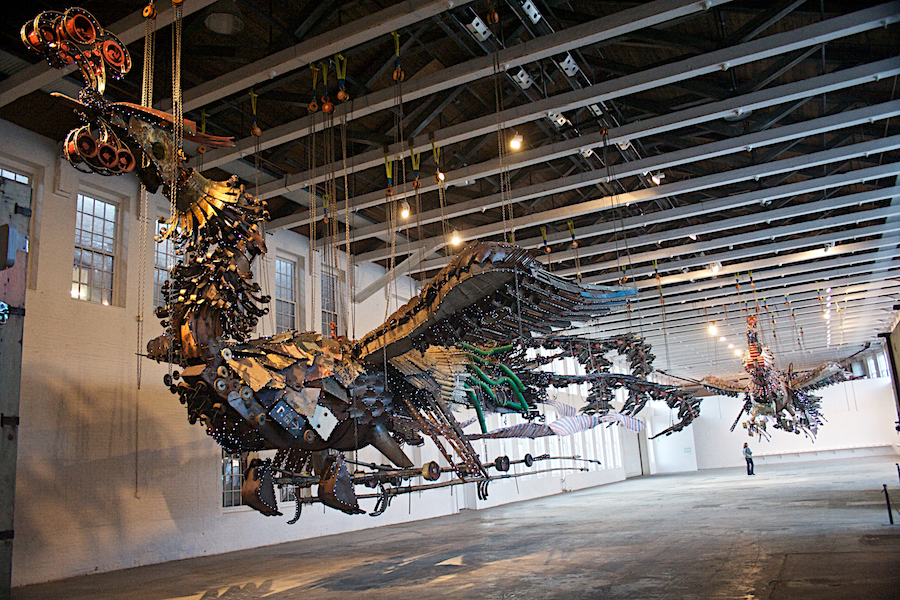How to write the poetry of finance capital? There certainly is a poetry in the modern market; in the glowing lights of the myriad digits that flit through a bank server; and in capital’s capacity to erect and destroy cities with the stroke of a pen.
But when all that is solid melts into air, how can an artist make capital itself into a tangible object for reflection? The artist Xu Bing attempted this task with his sculpture “Phoenix”: a pair of twelve ton, one-hundred-foot long birds meant to represent China’s new ascendance in this age of global capital, fashioned from scrap metal by a team of migrant workers. Xu Bing’s sculpture, in turn, inspired the contemporary Chinese poet Ouyang Jianghe to write a poem in tribute to the work, also entitled “Phoenix,” which Austin Woerner has recently translated.
The line between sublime and mere spectacle is very thin. Although Xu Bing is a remarkable artist, his phoenixes—garish, obvious, and extravagant—accurately represent China’s gilded age at its worst. But Ouyang’s poem, a complex meditation on all that is awesome and dreadful about the recent transformations of China, is a very different story. Ouyang Jianghe belongs to a school of Sichuanese poets known for writing poems that defy the gravity of conventional grammar and style, populated with impossible images. In the seventh verse of “Phoenix,” Ouyang writes (in Woerner’s rendering):
All time through which birds fly
can be unrolled and rolled back up like a scroll.
A reader must pause and ponder if she wishes to unravel the physics of these lines, much less what those physics signify—what would it mean to roll and unroll time like a scroll? Yet this noumenal complexity suits its subject well; the financial world is a place where a “future” is something to be bought and sold. In “Phoenix”’s patient consideration of the distortion of time, space, and humanity in contemporary China, and in the work’s own protean journey from spectacular metaphor to spectacular metaphor, one can see the poetry in the machine of capital.
This excellent Zephyr Books edition packages the poem together with pictures of the sculpture, and, in what happily seems to be becoming the norm, places Woerner’s translation alongside the original. The bilingual reader can thus fully appreciate that the translation, rather than aiming to fix the quicksilver of the original, is a piano four-hands between two talented writers. From verse 14:
Ransacks the void till no emptiness remains,
while prestidigitating truths from thin air;
空,本就是空的,被他掏空了,
反而凭空掏出些真东西。
Woerner translates “掏” (tao), “to pull out” or “to fish out,” as “ransack” in the first line and “prestidigitate” in the second. These words do not quite come out of thin air, but—to borrow from the language of finance—it is a leveraged interpretation, and its yield is spectacular. The Zephyr books edition of “Phoenix” is therefore poetry truly suited to this age of globalization: two poets from opposite sides of the world collaborating to illuminate the way of life that unites them both.
*****
Dylan Suher is a contributing editor at Asymptote. He was born and raised in Brooklyn. He has published reviews, criticism and essays in The Millions, The Review of Contemporary Fiction, and The New York Times.
Read more:

